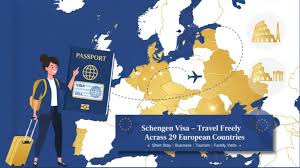
traveler
“The traveler sees what he sees, the tourist sees what he has come to see.” – G.K. Chesterton. At first glance, the words of Chesterton may seem like a simple distinction, but they offer a deeper truth about the way we approach the world around us. For many, “tourist” and “traveler” are interchangeable terms, but really, they represent two very different mindsets. Tourists often seek out the popular landmarks that they’ve already heard of and are popular attractions to fellow tourists. In contrast, a traveler embraces the unfamiliar, immersing themselves in the culture, language, and unique aspects of each and every place.
In fact, according to the UN Tourism Barometer, in 2024 alone, there were an estimated 1.4 billion international tourist arrivals globally, showing how many people travel each year. However, despite these impressive numbers, many still miss out on truly experiencing what their destinations have to offer. By transitioning from being a tourist to becoming a true traveler, one can open their eyes to a world full of new perspectives and deeper connections with the local environment along the way.
Travel offers a chance to step into the shoes of a true traveler, enriching life by challenging assumptions and expanding perspective. Immersing in different cultures reveals that there’s no single “right” way to live—only diverse approaches shaped by unique histories. For example, in Ho Chi Minh City, Vietnam, early mornings bring the city to life with motorbikes and street vendors, offering a focused yet vibrant start to the day. In contrast, South Korea’s relentless hustle culture felt draining, highlighting that true productivity can coexist with calm and presence. These observations can reshape approaches to balance and pace in life.
Becoming a true traveler is not as difficult as it may seem; it begins with small steps. The first step is trying local experiences that can transform into extraordinary, yet ordinary, moments. For example, cooking in an Italian home or attending a Japanese tea ceremony are daily activities for locals. But they become extraordinary for travelers, especially when they approach the experience with an open mind and creativity. Exposure to varied ways of thinking enhances problem-solving and deepens empathy, especially when interacting with different people from diverse cultural backgrounds. When living within one culture, it’s easy to fall into habitual thinking. But the more perspectives you encounter, the more flexible and open-minded you become—in work, relationships, and life.
Learning a new language—or even just a few key phrases—can be an important step in becoming a traveler, as it shows an understanding and willingness to connect with a new culture. Even picking up a few basic phrases in a language can make a huge difference. For example, if someone visits Korea and learns simple Korean phrases like “annyeonghasaeyo,” (hello) or “gamsahamnida” (thank you), these expressions can immediately break barriers and create rapport with the locals. Speaking the local language signals genuine respect that can lead to unexpected friendships.
An additional step to transforming from a tourist into a traveler is to resist the temptation of choosing a package tour, even when it promises affordability and convenience. It’s tempting to opt for an all-inclusive trip arranged by a travel agency, but such tours often miss the essence of travel: genuine cultural immersion. These curated experiences, while comfortable and predictable, lack the depth and spontaneity that make travel truly enriching. Is the goal of travel to eat familiar food, hear your native language, and be surrounded by fellow tourists? Of course not. Real travel begins when you step outside your comfort zone, engage with local traditions, and embrace the unpredictable beauty of a new culture.
Another perk of independent travel is that we can add value to the country that we travel. Package tour’s curated itineraries often insulate travelers from meaningful engagement with local life. In contrast, independent travel benefits both visitors and hosts. By straying from typical tourist paths, travelers support small, family-run businesses and directly contribute to the local economy. A clear example of this is Airbnb Experiences, which offers opportunities for travelers to participate in locally-led activities, from cooking classes to artisan workshops, often benefiting smaller, less commercialized communities. More importantly, respectful, authentic interactions promote cultural exchange. As guests, travelers should honor the hospitality of their hosts, recognizing that language barriers don’t lessen the value of a culture. Embracing these differences not only enriches the journey but also builds mutual understanding and respect.
One thing that should never be forgotten as a traveler is the power of sharing the experience with a loved one. Away from daily routines, travel offers the space to reconnect through new experiences—both joyful and challenging. Whether it’s getting lost in unfamiliar streets or trying strange dishes, these shared moments build trust, spark laughter, and make emotional bonds. The unpredictability of travel nurtures teamwork, creating lasting memories—memories that everyday life rarely has the space to offer. This connection is truly the pinnacle of travel.
Here’s the final attitude to keep in mind: embracing the freedom to fail is a key part of traveling. Trying something new awakens curiosity—and with it, the chance to learn through trial and error. Whether it’s figuring out a foreign supermarket or ordering from a menu in another language, the process of stepping into the unknown becomes part of the adventure. There’s joy in the unexpected, even in small missteps. In Taiwan, facing an unreadable menu, dishes were chosen at random —some disappointing, others surprisingly delicious. One, a rich and savory beef noodle soup, became a memorable discovery, something worth searching for again the next day. It was a reminder that trying the unfamiliar often leads to the most rewarding experiences.
In the end, the most fulfilling travel comes from adopting the mindset of a true traveler, not just a tourist. It’s not about ticking off a list of famous landmarks, but about engaging with the unfamiliar, connecting with local cultures, and appreciating the simple, often overlooked moments. Even small efforts, like learning basic phrases or joining local traditions, can transform a trip into something meaningful that can be cherished with a loved one for a long time. Travel done this way leaves lasting memories, broadens perspective, and brings inspiration that carries well beyond the journey itself.
By: Janice Kim Lee
Write and Win: Participate in Creative writing Contest & International Essay Contest and win fabulous prizes.


